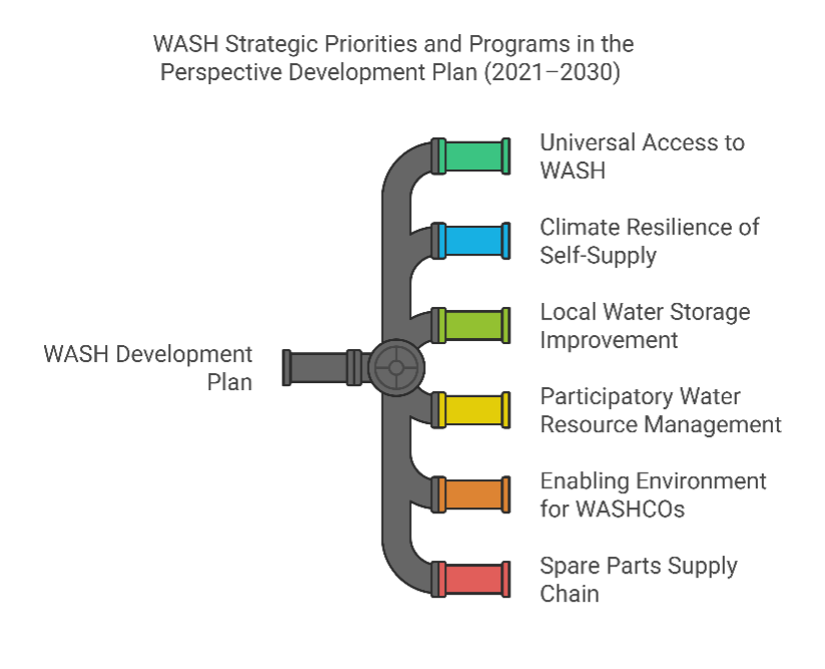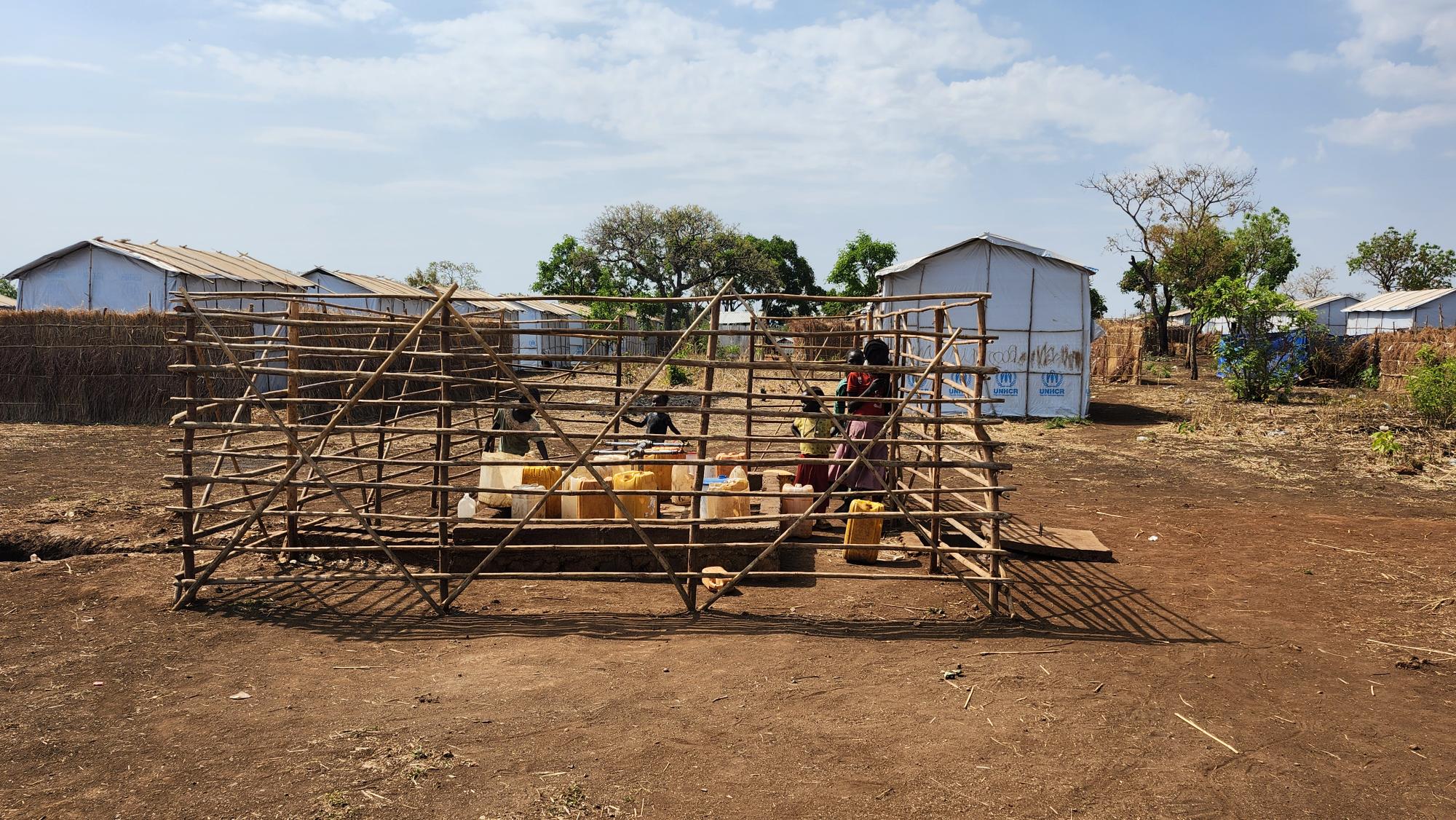Water & Sanitation in Ura Settlement
Water & Sanitation in Ura Settlement
On this page
What is the vision for the provision of water, sanitation and hygiene services in Ura woreda?
Integrated water service provision: The development of inclusive water systems will be top priority to bring a development approach and a more sustainable ‘whole of society’ approach the Ura settlement and neighbouring Akuda kebele and, in turn, support and encourage peaceful co-existence between host communities and refugees.
Climate change adaptation: Undertake groundwater monitoring at all newly drilled boreholes to monitor underground water abstraction performance levels and share information with the relevant local administration.
Solarization: Aim to reduce operational costs and negative impacts on the environment by reducing greenhouse gas emissions, increasing energy efficiency, and reducing climate change impacts.
Family latrines: Each refugee household in Ura settlement has a family latrine. With a projected number of 34,000 refugees in Ura, an estimated 6,800 family latrines need to be built for refugees.
Institutional WASH support: Improved and expanded access to quality water, sanitation and hygiene services at schools and health facilities.
Efforts to expand water supply provision will be undertaken with the Regional Water Bureau, to ensure that the response is anchored within the broader planning done by regional and local authorities.
The Ura settlement is regularly cleaned and well maintained by its community, and recycling options are promoted.
What is the enabling policy environment?
The Government of Ethiopia has identified water and sanitation as a priority in its Ten-Year Perspective Development Plan (2021–2030) to achieve sustainable economic growth, poverty reduction and targeted health and social outcomes. The plan sets out goals for reaching 100% access to safe drinking water in both rural and urban areas, with increasing water quantity available and increasing access to piped water. It also sets goals of 100 cities having sewerage systems, all rural residents having toilets, and all education and health institutions having water and sanitation services.
The Ethiopian Water Resources Management Proclamation No. 197 of 2000 provides some grounds for the development of new models, such as a water utility, for water systems serving more than 15,000 people.
What are national standards guiding WASH provision?
Water provision standards:
- For rural setup: Provide rural water supply access with revised GTP-2 minimum service level of 25 Lit/c/day; where accessibility is within 250m from the water delivery point.
- For urban dwellers: Provide urban water access with GTP-2 minimum service level of 80 lit/person/day (l/p/d) depending on the category of the cities, accessibility within 250m distance.
Sanitation guidelines:
- Improve access to and use of sanitation & hygiene facilities at community levels; through the initiative of CLTS (community led total sanitation) and SM (sanitation marketing).
- Expand community empowerment actions for improved sanitation and hygiene through:
- Increased model households
- Increased awareness and safer behavior
Increased full participation (particularly women) in policy formulation, planning, implementation, monitoring and evaluation, regulation; and resource mobilization.
How will progress be measured?
A water supply scheme is capable of providing at least 20l/p/d for all refugees and host community individuals, spanning Ura settlement and the Akuda woreda.
Every refugee household in Ura settlement has access to a safe and dignified family latrine.
A good water supply governance is established through the empowerment of community led WASHCO committees and involvement of local authorities. This requires a progressive transition of authorities, from the WASHCO committees to become water user associations towards eventually the establishment of a water utility. The community and local authorities will take full ownership and develop a mindset to take care of the system.
A functioning central maintenance workshop at Assosa level to repair water systems, equipped with tools for basic and major maintenance.
The Regional Water Bureau includes the Ura settlement in its sector plan and budget to ensure the sustainability of the water system.
What are the recommendations and priority investments?
One water system has been established for Ura settlement, using generators to pump from the river nearby the settlement. This system has been established with EU INTPA funds. Plans are underway to drill three boreholes and solarize and further connect them to the national grid, to reduce the dependency on fuel. Four back-up surface pumps are being procured. An extension is underway to connect the water system to the Akuda kebele - to the health center and primary school to meet the water needs of the host community. The Ura water system is also going to be solarized. Sixty communal latrines have been constructed with SIDA funding in Ura settlement.
What additional investments are required to deliver on this vision?
Upgrade the Ura woreda water system (e.g., rehabilitate the existing borehole, replace old pipes and improve the storage capacity) and construct additional water distribution points.
- Introduce new modern technologies of irrigation to allow for year-long agriculture practices around the Ura settlement.
- Build capacity of the Regional Water Bureaus and Woreda Water Development Offices for the management of water systems, including the establishment of one central workshop at Assosa level for operational water maintenance.
- Build capacity of community volunteers (area mechanics) to equip them with the necessary knowledge and tools for operation and maintenance of water systems, including basic plumbing and replacement of basic water system components at water collection points.
- Looking ahead as the water system is upgraded and maintained, and refugee inclusion progresses, a pro-tariff system can be introduced to recover capital investments and to have operational funds for the operation and maintenance of the systems.
- Construct safe and dignified sanitation facilities with cash-based intervention.
- Build gender segregated sanitation facilities in schools and health facilities and other public centers.


